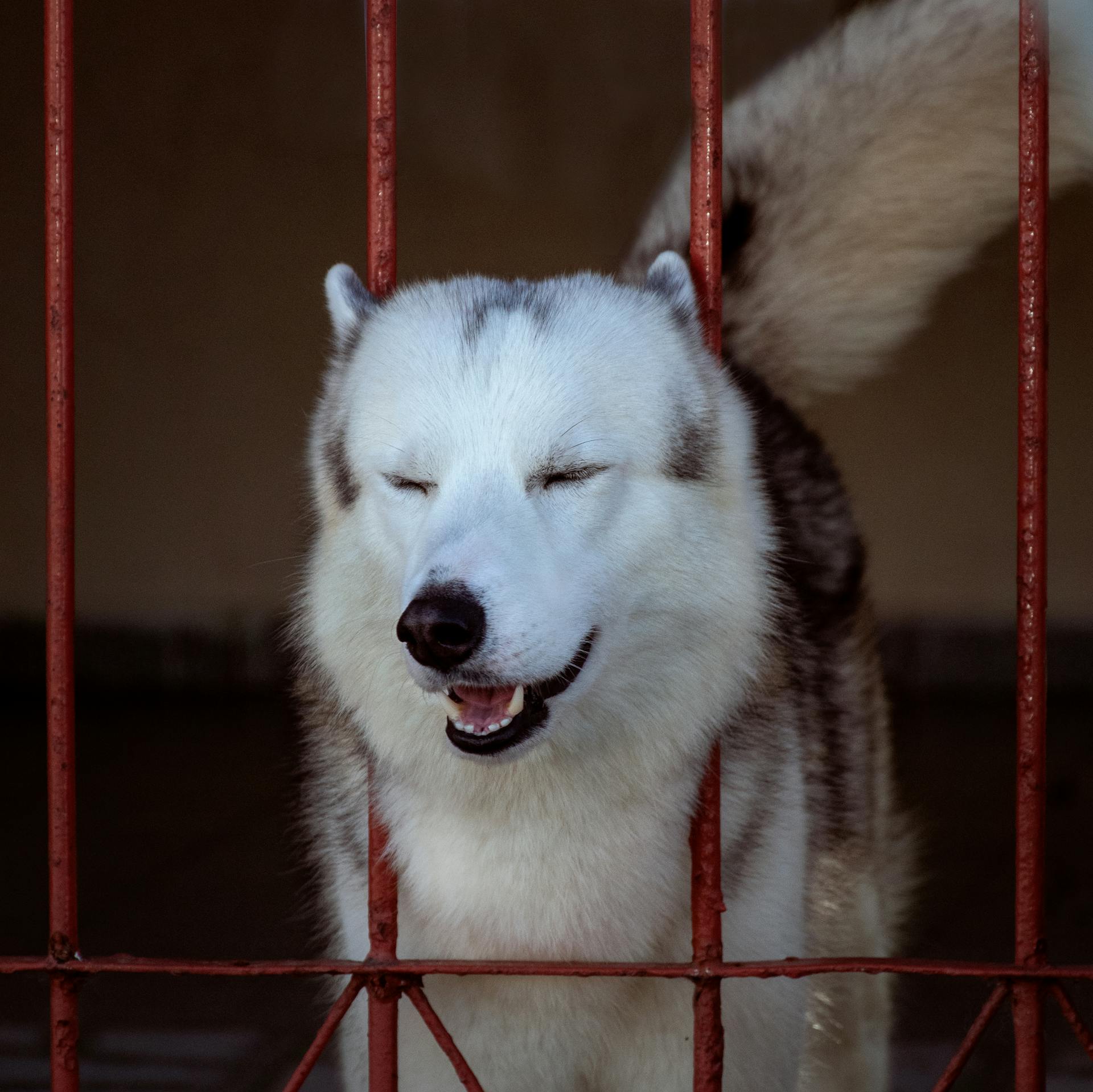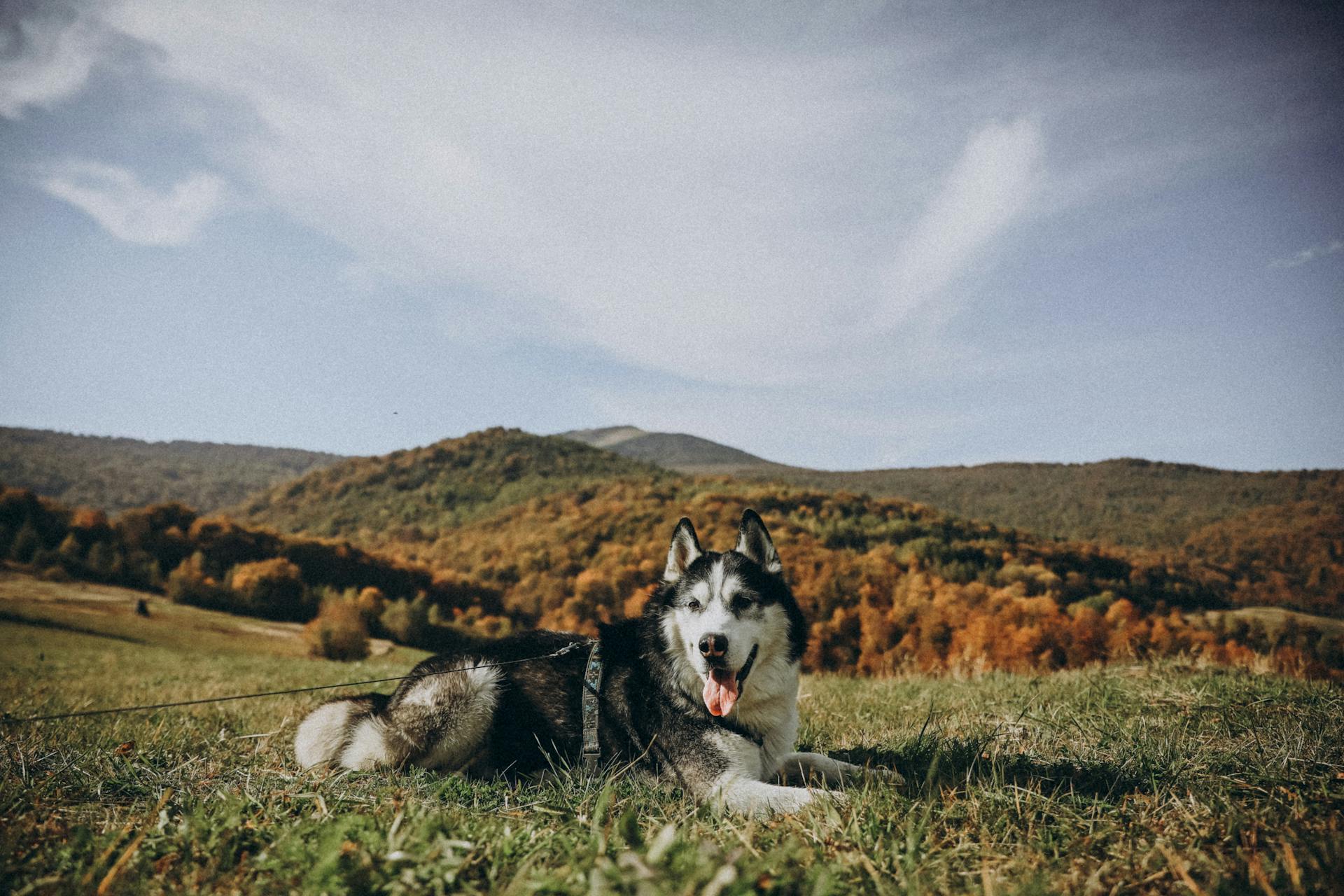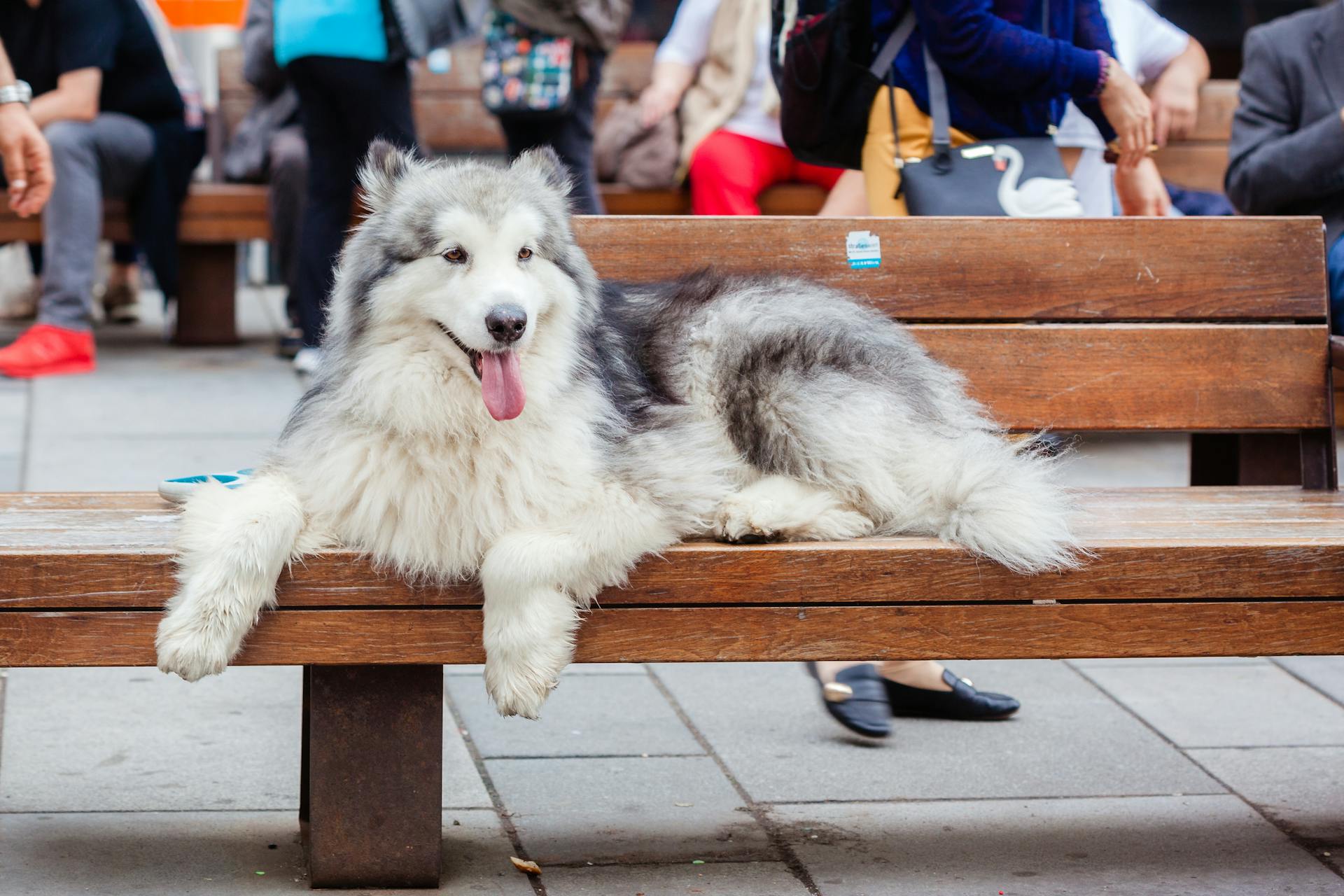
As you consider bringing an Alaskan Husky into your family, it's essential to understand their life expectancy. On average, an Alaskan Husky lives for around 12-15 years, but with proper care and attention, some have been known to live up to 17 years.
Their lifespan is influenced by factors such as diet, exercise, and health conditions. A balanced diet that meets their nutritional needs is crucial for maintaining their overall health.
Worth a look: Shih Tzu Life Expectancy Human Years
Factors Affecting Lifespan
Genetics play a significant role in determining a Husky's lifespan. Responsible breeding practices, including selecting parent dogs with a clean bill of health, contribute to the development of healthier Huskies with longer life expectancies.
A comfortable and safe living environment has a positive impact on a Husky's lifespan. Providing adequate shelter, a balanced diet, and regular veterinary care all contribute to their overall well-being.
Huskies, with their thick coats, may face challenges in extreme temperatures. Climate-appropriate care, including proper hydration and shade in warmer weather, as well as protection from harsh cold conditions, is vital for their well-being.
You can provide your pup with good living conditions, a suitable diet, and regular veterinary checkups, which can help determine how long your dog lives.
Common Health Issues
Alaskan Husky life expectancy is influenced by various health issues that can affect their quality of life, even if they don't shorten their lifespan. Hip dysplasia is a common concern, which can lead to lameness and decrease their life expectancy.
Hip dysplasia can be managed with omega-3 fish oil and natural pain-relief supplements, but it's essential to ask breeders if they've had their huskies evaluated for this condition. Regular veterinary check-ups can also help identify potential issues early on.
Eye problems are another common health issue in huskies, with juvenile cataracts, corneal dystrophy, progressive retinal atrophy, and glaucoma being the most common issues. These conditions can decrease your pet's quality of life and make them less active.
Here are some common eye problems in huskies:
- Juvenile cataracts: a disorder that makes the lens of your husky's eye look opaque
- Corneal dystrophy: a health issue that causes a dog's corneas to become opaque and can lead to decreased vision
- Progressive retinal atrophy (PRA): a genetic disorder that causes your dog's vision to slowly deteriorate, leading to blindness
- Glaucoma: a disease that can cause sudden or gradual loss of vision due to an increase in eye pressure
Regular veterinary check-ups and preventive measures, such as providing a balanced diet and regular exercise, can help manage these conditions and ensure your husky remains healthy and happy.
Understanding Lifespan
Genetics play a significant role in determining a Husky's lifespan, with responsible breeding practices contributing to the development of healthier dogs with longer life expectancies.
A typical Husky's lifespan is between 12 and 15 years, although some may live up to 18 years or more.
As a medium to large breed, Huskies enjoy a longer lifespan than large breeds, but this is dependent on factors such as diet, exercise, and genetics.
Huskies are known to live around 12-15 years, which is longer than many breeds, making every minute you spend with your best friend precious.
A Husky's lifespan can be influenced by factors such as diet, exercise, and regular vet checkups, which can help them lead a happy and healthy life.
Huskies are recognized as a healthy breed, but potential challenges like hip dysplasia can affect their lifespan, making it essential to ensure their well-being.
Female Huskies can live as long as 15 years, while their male counterparts may be more prone to reckless behavior that can shorten their lifespan.
To ensure your Husky reaches its full potential, it's essential to pay special attention to their development during the first 18 months of their lives.
For another approach, see: Average Lifespan of a Pug Dog
Genetics and Breeding
Genetics and Breeding play a crucial role in determining an Alaskan Husky's lifespan. Responsible breeding practices are essential for developing healthier Huskies with longer life expectancies.
Choosing a reputable breeder is paramount to ensure the longevity of your pet. They prioritize the health and well-being of the Husky breed, taking measures to avoid genetic disorders.
Genetics play a pivotal role in a Husky's lifespan, and selecting parent dogs with a clean bill of health is key. This contributes to the development of healthier Huskies with longer life expectancies.
Considering spaying for female Huskies can contribute to a healthier breed population. This can help reduce the risk of certain health problems.
For your interest: Cavalier Dog Breed Lifespan
Maintaining Health
A balanced diet is crucial for your Alaskan Husky's health, so look for dog food with a recognizable protein source as the first ingredient and other whole foods in the ingredient deck.
Regular vet checkups are essential to monitor your Husky's health and catch any potential issues early on, such as hip dysplasia and eye problems.
Exercise is vital for your Husky's physical and mental well-being, so ensure they get plenty of physical activity each day, which can also increase their life expectancy.
Obesity can decrease your Husky's lifespan by up to two and a half years, so monitor their food intake and work with your veterinarian if needed to keep them at a healthy weight.
Diet
A healthy diet is crucial for your husky's overall well-being, and it plays a significant role in their life expectancy.
Huskies need to eat a complete and balanced diet that's rich in nutritious whole foods, including meat, fruits, vegetables, and whole grains.
While there's ongoing debate about the best type of dog food, there isn't enough scientific evidence to support one type over the others. So, as dog owners, we just have to do our best.
Look for dog food with a recognizable protein source as the first ingredient and other whole foods in the ingredient deck.
Avoid grain-free recipes, especially those that list pulses like beans, peas, and lentils as main ingredients, as they're under investigation for potentially causing heart disease in dogs.
Make sure store-bought dog food meets the AAFCO standards for a complete and balanced diet.
If you're making your dog's food from scratch, work with a veterinary nutritionist to ensure your dog is getting all the necessary nutrients.
Obesity can decrease your husky's lifespan by up to two and a half years, so it's essential to keep your dog at a healthy weight throughout their life by monitoring their food intake.
Work with your veterinarian if you think your pup needs to be put on a weight loss plan.
Exercise
Exercise is crucial for huskies, who were bred to pull sleds long distances across the Arctic.
Their energy level is rated as "high" by the AKC, and they need plenty of exercise to stay healthy.
Regular physical activity can increase a husky's quality of life and even extend their life expectancy.
Gentle exercise can also help reduce the symptoms of arthritis and other mobility issues in dogs.
Taking your husky for a run each day is a great way to keep them active and happy.
If you live in a cold climate, consider enrolling your husky in sled dog training to keep them active in the winter and tap into their working dog instincts.
Prioritizing Health: Common Concerns and Proactive Measures
As a responsible Husky owner, it's essential to prioritize your dog's health. Regular vet checkups can help identify common health concerns, such as hip dysplasia and eye issues, early on.
Hip dysplasia is a condition that can lead to arthritis and lameness, particularly as Huskies age. This can significantly impact their quality of life.
To prevent or manage hip dysplasia, provide your Husky with a balanced diet and regular exercise. Omega-3 fish oil and natural pain-relief supplements can also support their joint health.

Eye issues, such as cataracts and progressive retinal atrophy, can also affect Huskies. These conditions can impair vision and even lead to blindness.
Huskies are prone to progressive retinal atrophy, a genetic condition that causes gradual vision loss. Regular eye exams with a veterinarian can help detect this condition early on.
To ensure your Husky's overall health, prioritize regular vet checkups, a balanced diet, and regular exercise. This will help prevent or manage common health concerns and ensure your dog lives a long and happy life.
Here are some common health concerns to look out for in Huskies:
By being aware of these common health concerns and taking proactive measures, you can help your Husky live a long and healthy life.
Senior Care Tailored to Unique Needs
As your Alaskan Husky ages, being attuned to signs of aging becomes essential. Awareness of the transition into their senior years allows for proactive care tailored to their specific needs.
Huskies are highly energetic dogs, but like all breeds, they start to slow down as they age, typically around 7 or 8 years old. At this age, they will tire out more quickly.
Changing to a senior diet is a good idea at this stage, as it will help support their aging body. A senior diet is specifically formulated to meet the unique nutritional needs of older dogs.
Regular exercise is still important, but it's essential to reduce the amount of intense exercise given to your senior Husky. This will help prevent overexertion and support their overall health.
Factors such as high blood pressure become more significant in senior Huskies, emphasizing the need for regular vet checkups. Keeping an eye on canine eye registry foundation recommendations is essential for preserving your dog's vision.
By incorporating these elements, you can ensure that your senior Husky enjoys their later years with vitality and joy.
Expert Insights and Guidance
Veterinarians recognize the distinctive qualities of Siberian Huskies as a healthy dog breed, offering invaluable insights into ensuring their well-being and extending their lifespan.
Expert recommendations from veterinarians encompass various facets of care, including nutrition, exercise, and regular vet checkups, to ensure your husky thrives in every aspect of their active life.
The lifespan of a Siberian Husky can be influenced by factors such as genetic predispositions and environmental hazards, which veterinarians emphasize the importance of being aware of.
Regular vet checkups are crucial to address issues like high blood pressure and to stay vigilant about the canine eye registry foundation recommendations for preserving your dog's vision, especially as they transition into being a senior dog.
Veterinarians offer guidance for pet parents seeking to provide optimal care, including a holistic approach that considers various aspects of your husky's life, from nutrition to exercise and beyond.
Understanding the potential risks that can shorten a husky's lifespan allows pet parents to take proactive measures in creating a safe and nurturing environment for their dog.
Frequently Asked Questions
What is the leading cause of death in Huskies?
The leading cause of death in Huskies is cancer, particularly common types such as basal cell tumors and hemangiopericytomas. Learn more about the specific cancer risks and prevention strategies for your Husky.
Is 12 old for a husky?
A 12-year-old Siberian Husky is considered middle-aged, not old, and with proper care, they can live up to 14 years or more. However, their age can impact their health, so it's essential to understand the breed's common health issues.
Sources
Featured Images: pexels.com


